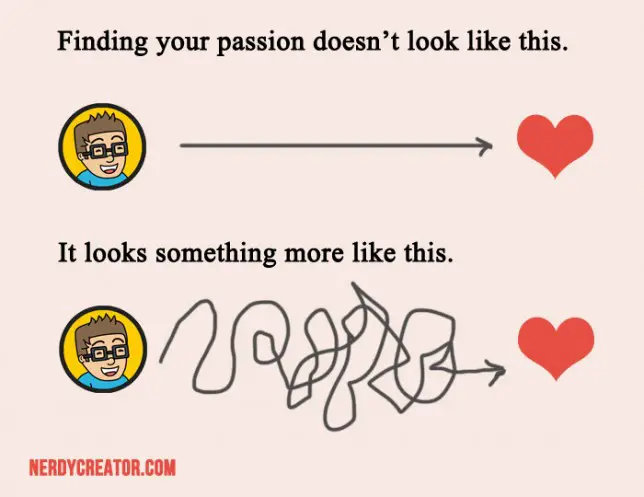Disclosure: There might be affiliate links on this page. As an Amazon Associate, I earn from qualifying purchases. This means I will earn a commission if you decide to make a purchase through my links but it will be at no additional cost to you.
What are you passionate about?
How do you find your passion in life?
Six years ago, when I felt depressed with my first job as an auditor, I became committed to pursuing my passion and started learning more about my passion.
Over the years, I realized that finding your passion isn’t a one time exercise which you can do it once and put it aside. Finding your passion is a lifetime of listening to your joy, discovering yourself, and having clarity over your purpose. Even though I wrote a book on passion, I’m still discovering a lot about my passion to date.
How do you pursue and follow your passion when you don’t know what your passion is? I believe that passion possesses the following four elements that form the word “leap” and they lay the foundation for finding your passion in life:
- Love
- Energy
- Authenticity
- Purpose
How to Find Your Passion and Know Your Purpose in Life
1. You find your passion by listening to joy.
When someone doesn’t know what their passion is, it could be one of the following two reasons:
- They don’t know how they feel.
- They know how they feel, but their mind gets in the way.
Don’t use your mind to find your passion, use your heart.
Passion is about love and energy. When you do something you love, you know it because you feel joy doing it. You don’t use your mind to figure out if you love something or not, you use your heart.
Whenever you do something, ask yourself: “How does it make you feel?” Be aware of the emotions you are feeling at that moment. Don’t worry if you can’t make a living out of it, or your passion seems silly or insignificant. Your intellects are doing analysis on your passion. Leave it for later. Your mind is great for many things, but finding your passion is not one of them.
2. Don’t find your passion; discover your passion.
Most people think that they need to find their passion before they can pursue it. They think it’s a linear process:
- find a passion,
- put all their effort and time on it to get better in it, and
- stick with it.
The truth is finding your passion is all about trial and error. It’s a self-discovery process. The more you do and try something new, the more you discover what you genuinely enjoy doing.
Finding your passion is not a linear process; it’s a discovery process.
Passion is about authenticity. Some people may think that I’m fickle-minded because I kept changing my job. But from my perspective, I’m just fine-tuning and recalibrating my life whenever I received new information about myself. Every job I do, I know more about myself, and what I love and hate to do. I’m just collecting information.
For example, recently I’m very grateful to have this opportunity to volunteer at my friend’s company. I got to try various jobs and listen to what my joy says without the influence of money. It helped me discover what I really enjoy doing.
Here are some of the things I did and how I felt about them:
- Designing: It was ok. I enjoy making things look nice. It’s fun and non-stressful. But not something I want to do every day. It’s more like a hobby.
- Printing photos: I did enjoy helping people, but it was super stressful. I had to deliver the photos before the event ends. That could only mean one thing – meeting tight deadlines is not one of my strengths. Now I know why I dislike being an auditor and animator. Their deadlines are ridiculously tight.
- Doing accounts: Boring! Why am I doing this again?
- Teaching other people how to do accounts: I felt joy solving difficult issues and teaching other people. My confidence went up when I teach.
So I had an a-ha moment. Why don’t I give tuition?
When I was young, one of the three jobs I aspired to be is a teacher. But I gave up the idea of being a school teacher because I don’t like to stand in front of a class of 30-40 students and teach. I prefer to teach one to one so that I can put all my attention on the student and help him or her understand the concepts.
Upon reflection, I realized I always enjoy teaching the newcomers at HBO Asia. I used to give free tuition to my peers in school and I was a peer buddy in Animation Mentor for a year. I find it very fulfilling to see someone grasp a concept they previously can’t. So this week, I started giving tuition. And after the first lesson, I actually find it very rewarding.
Not sure how it will go in the future though. But it’s all about testing, isn’t it?
3. Don’t ask, “WHAT is your passion?”, ask WHY.
In my book Fearless Passion, I mentioned that passion is purpose. It gives you direction. So instead of asking yourself, “WHAT is your passion?”, ask yourself:
Why do you love doing what you do?
When you ask yourself WHAT you love to do, you brainstorm. You get a gazillion different passions. Not bad if you don’t know where to start. But having too many different passions would eventually diverge your attention and focus.
Instead, ask yourself WHY you love doing what you do. Even though there are many things you love to do, not all of them are equally important to you. When you understand WHY, you have a clearer path and direction to follow.
Recently, I read Simon Sinek’s Start with Why. Even though it’s a business book for leaders, I am able to draw concepts from it and applied to my own life. In his book, he mentioned that we have to work from inside out instead of outside in. In other words, we have to:
Start with WHY, then HOW, and followed by WHAT.
All these while I had been focused too much on the WHAT – the animation. I didn’t have much clarity on my WHY and that’s why I found being an animator not fulfilling for me. Even though Animation is WHAT I love, the only type of animation that I truly love is the one from Pixar. I love HOW their stories are being told. And the main reason WHY I love their stories so much is that I can relate to them and learn something about myself.
It took me so long to understand that the only reason why I did animation is that I wanted to help others learn more about themselves through stories and animation. It doesn’t matter if I do animation, write, or give tuition, as long as I can share my insights and inspire other people to grow and be better, I satisfy my purpose in life.
When I look inside out and start with WHY, everything gets easier:
- WHY (My Purpose): Inspire other people to learn and grow.
- HOW (My Strength): Sharing my insights through writing, storytelling, and teaching.
- WHAT (What I Do): Books, blogs, tuition, animation, video, designs, etc. It can be anything!
What you do don’t matter at all as long as they align with your purpose. When you know your WHY, you know WHAT your passions are. What do you think?
Featured Photo Credit: Dreams / Jeremy
Find your passion in life.
For more inspiration and insights, check out my book Fearless Passion.










